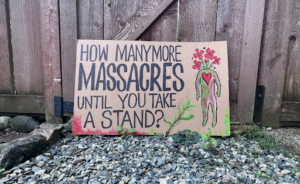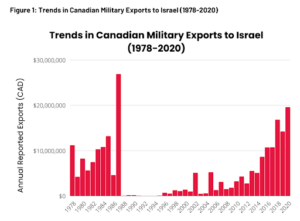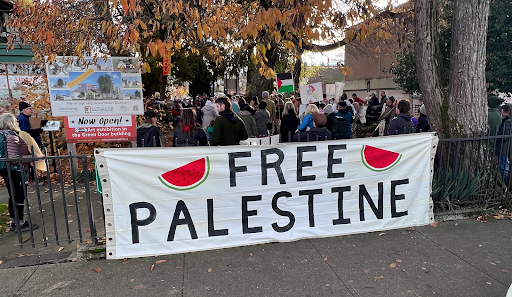July 1, 1867 was an epic party. Massive bonfires raged with fireworks exploding overhead. A festive ox feast was shared by the rich and the poor while some competed in canoe races and lacrosse games, all to mark the day of confederation. After a few hundred years of brutal colonization, “Canada” was finally its own country. While settlers celebrated (or protested, as was the case in Nova Scotia when disgruntled colonists burned effigies and a live rat), Indigenous people were being massacred, forced off their land and ethnically cleansed. Unsurprisingly, I couldn’t find any acknowledgement of Indigenous people in the news from that day. After all, settlers were celebrating the new land and culture they were forging. Why would they let a thing like genocide dampen the festivities?
A few months ago, I attended a local event called Feast for Palestine. I was among several hundred event attendees who shared an incredible meal cooked by Palestinian chefs. As we ate delicious roasted chicken with savoury rice, we listened to a panel of Palestinian and Indigenous rights activists who told stories and offered reflections of what colonization means in the context of Canada and Palestine.
Seventy-six years of occupation in Palestine and 500 years of colonization of Turtle Island. I left that panel with a sense of hope that a new, anti-imperialist world could be possible. But the weeks went on and the hopefulness yet again drifted to despair as the news coming from Gaza continued to broadcast horrors beyond my imagination directly to my smartphone.
Every “Canada Day” is a day of reflection for me, as a Métis person with British/Ukrainian ancestry, about what decolonization looks like in the contemporary context. This year, however, my reflections are more international while I face what it means to be complicit in a genocide. What it means to watch the most depraved parts of humanity and the deepest suffering, all while I am safe and fed in my home. What kind of responsibility do I have as a person with this immense privilege?
Just as the colonial settlers were complicit and responsible for the ethnic cleansing of the Indigenous peoples, “Canadians” are complicit in the Gaza genocide and many other armed conflicts around the world, and we have a responsibility to actually do something about it. We must hold the genocidal politicians accountable.
Child massacres live-streamed while the world goes on
On May 27, I was sitting in my living room with my family when I mindlessly grabbed my phone and checked Facebook. I saw the video within a few seconds. I saw the video of a man in Rafah standing in front of a backdrop of burning tents and people screaming for their lives. Held firmly in his hands was the body of someone—a child. He was holding up a child with no head.
I stared at my screen for a few seconds before I understood what it was. A young child—somebody’s baby. Lifeless. Headless. A corpse. I don’t describe it this way for shock value but as an attempt to smack some sense into anyone reading this who may still feel unaffected by dead and mutilated children broadcast on our screens and subsidized by our own tax dollars.
On May 26, just two days after the International Court of Justice demanded an end to Israel’s assault on Rafah as it is obliged to do so under the Genocide Convention, an Israeli airstrike triggered a catastrophic fire near the refugee camp, Tel al-Sultan. This attack, since dubbed the Tent Massacre or the Tel al-Sultan Massacre, sparked international condemnation of Israel’s continued ground assault on Rafah. The Tel al-Sultan refugee camp is supposed to be a humanitarian zone, which ABC Australia reported was designated as such by Israel. At least 45 people were killed in the fire and 200 were injured—many of the victims burned alive as their tents melted into their skin, the bodies of children blown apart from the blast, and their parents screaming in agony as their babies were brutally and senselessly stolen from this world.
Photos and videos from the aftermath of the massacre show wounded babies being treated amidst the rubble, Palestinian mourners sitting among their dead kin, children’s eyes marked by trauma gazing into the distance. Israeli officials denied that this bombing of refugees living in tents was deliberate, claiming that the fire was caused by a cache of Hamas weapons stored nearby. After the massacre, the Israeli news outlet Haaretz reported that some far-right Israelis took to the streets to celebrate the fiery scene, comparing the flames to the bonfires lit on the Jewish holiday, Lag Ba’Omer.
As the world watched the aftermath of the Tent Massacre from our screens, I thought that surely this would be the catalyst—the tipping point that plunges every single world leader into action to do anything and everything they can to stop this. But then, nothing.
Nothing.
Two days later, Israel did it again. Israel struck a designated humanitarian zone in a small fishing village called Al-Mawasi, but again, denied it. The attack on Al-Mawasi, a small plot of land in the Gaza strip that holds tens of thousands of displaced Palestinians, killed at least 21 people.
Then the world kept spinning and people here in Canada moved on. I attempted to write an article on the Tent Massacre but gave up—I couldn’t find the words to do it justice and every time I opened my laptop there was a new massacre to report on. But the image of the headless child flashes before my eyes when I look into the eyes of my son. How can the world move on?

It is inconceivable that after all we know as a collective species about genocide and war, many people continue to just watch, or worse—put their heads down and hide, as history repeats itself. While politicians sit in the House of Commons and debate with their hollow words and inauthenticity, our “ally” Israel commits crimes against humanity with the supplies, money and support Canada offers, seemingly unconditionally. After all, support for Israel has been at “the core of Canada’s Middle East policy since 1948,” says the government (1948 was the year of the Nakba). This complicity will forever haunt Canada and all the Canadians who choose to turn away and pretend like it’s not happening.
I would be amiss to not acknowledge those who do take action, however. There have been activists, writers, politicians, students, and every-day workers who have protested, rallied, and occupied spaces in an attempt to stop the slaughter. But this has been the exception, not the norm. And they have been met with fierce opposition and censorship.
The neutrality and apathy of broader Canadian society is not surprising—many covered their eyes in 1867 and have all the years since, pretending not to see the ethnic cleansing of Indigenous people of Turtle Island. Just as the Palestinian and First Nations panelists at the feast said: the struggles are intertwined.
Canada will atone for its complicity in crimes against humanity
The United Nations released a statement on June 20, reiterating firmly that all states must stop sending arms and munitions to Israel, or else risk being complicit in “international crimes,” including the possibility of a genocide. It released a similar statement in February. Still, Canada appears to be continuing weapons and supplies to Israel in varying capacities.
On March 18, a motion to end weapons exports to Israel was passed in the House of Commons, after controversial last-minute amendments. However, it is unclear whether Canada has actually stopped. Defense News, a military news organization for senior military and industry decision-makers, reported that the House of Commons motion “failed to address Canada’s transfer of military end-use parts and components to Israel via the United States.”
As reported in The Maple in June, Canada’s military exports in 2023 were the highest they have ever been. The Canadian government claims that these munitions are “non-lethal,” but that term carries no real definition and could include components of weaponry used in crimes against humanity.
Human rights groups and activists have been trying to end this complicity by calling for an arms embargo on Israel for years. In 2022, Canadians for Justice and Peace in the Middle East published an in-depth report of Canada’s ever-increasing military exports to Israel, despite well-documented military operations in the context of an occupation and apartheid, which is against international law.
The report found that in 2022, exports to Israel were at the highest rate since 1987—the year that Canada imposed an embargo, reducing military exports to Israel to virtually nothing during that time. The first intifada broke out in late 1987 and as the report states, many Canadian officials and policymakers believed it was “morally objectionable” to sell military goods to Israel, or to even purchase them. What changed?

It’s not just the arms deals that makes Canada complicit in the genocide and ethnic cleansing of Palestinians. A open letter from June 3 signed by many prominent activists, academics, health professionals and politicians urged Prime Minister Trudeau to stop subsidizing genocide. Just Peace Advocates says that Canadian charities are donating millions to Israel even though its GDP is equivalent to or surpasses Canada. These charities have been shown to transfer funds to far-right Israeli organizations that have been involved in physically blocking humanitarian aid from entering Gaza.
The Canadian Armed Forces is also partnering with Israel. In October 2023, Global News reported that a small and secretive unit of the Canadian Armed Forces called Joint Task Force 2 had been deployed to Israel, and more recently on June 27, the “Exercise Rim of the Pacific 2024” began as 29 nations including Canada and Israel are set to travel through the Indo-Pacific doing combat training on land, air and sea.
It’s worth repeating: Canada is participating in military exercises with a country that is currently facing charges for war crimes and crimes against humanity for an ongoing and well-documented genocide.
Glimmers of hope
There is evidence that the Palestinian-led BDS (boycott, divest and sanction) movement has made substantive direct and indirect impacts on influencing states, corporations, and organizations to end complicity in Israel’s war crimes. It is disturbing, however, to see that a legal and non-violent campaign that leverages the capitalist system is labeled as anti-semitic by the Canadian government—but that’s a can of worms for another day.
On a local level, I have been inspired by a small but mighty group of anti-war activists who march or take some form of action every Saturday, because they know that we can’t just sit and do nothing. But mostly, I am inspired by Palestinians, through the violence and ethnic cleansing, who have resisted and fought to show the world their resilience and tell their stories—ones that are so often ignored, especially when it comes to the words of Palestinian women.
The settlers from the day of Canadian Confederation in 1867 pretended they did not see the Indigenous genocide. What will it take for Canadians now to stand up to the Canadian government for the people of Palestine?
“To live under occupation is to wake up in the morning and see a settlement on your land. It’s to feel the summer heat but never be allowed to reach the beach, which is only a half hour away. To live under occupation is to have all of your dreams threatened since childhood. You want to be a footballer for example, or an athlete. But you get shot in the foot and lose that dream. The occupation destroys everything.”
-Ahed Tamimi, 23-year-old Palestinian rights activist from the occupied West Bank.
We hope you enjoyed this column. rabble.ca has never hid behind a paywall because we believe opinions like this one are important to be accessible to everyone. As a result of this, we rely on reader support to help fund the work that we do. rabble.ca is currently running our summer fundraiser – will you join the team of rabble rousers who ensure important stories like this one remain free and accessible to all? Click here to support rabble today.



